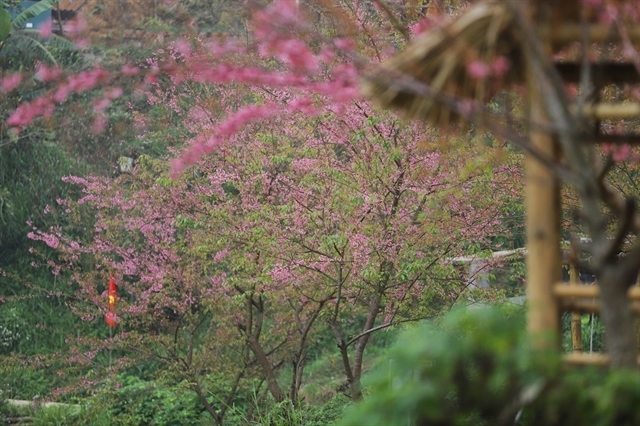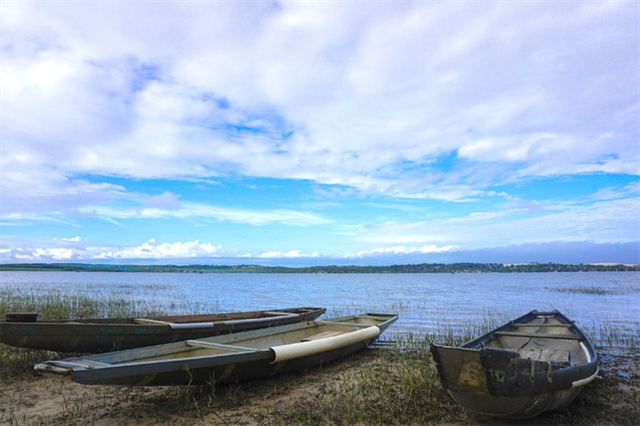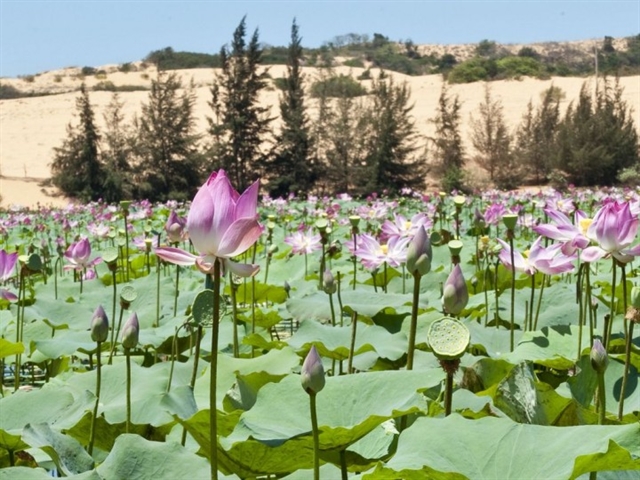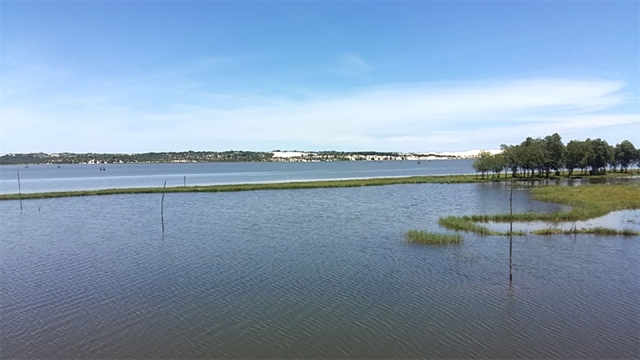 Features
Features

Bàu Sen (Lotus Lake) in the central province of Quảng Bình's Lệ Thủy District is emerging as an attractive new destination in the sunny and windy coastal area of northern Central Việt Nam.
Located about 50km from Đồng Hới City, the lake with its transparent water looks like an oasis, with sunshine all year round. It is luring more and more visitors to enjoy the tranquil beauty, hear legendary stories, and try the unique local cuisine.
The lake spans about 8.5sq.km. Local residents said it is called Bàu Sen because lotus plants are grown on vast areas of the lake. Every summer they are in full bloom spreading their fragrance all around.
The lake's scenery changes over time in a day. In the morning, layers of mist cover the surface, making it look like a fairyland. At noon, the lake sparkles with rainbow colours as a result of the sunlight's reflection. In the afternoon, the sunset glows red in the sky, leaving a majestic scene. When night falls, the lake becomes quiet and clear, but under a sky of stars magically sparkling.
It is locally called a "bottomless lake" since it has never dried up even on the hottest days of a summer drought. Many also wonder why the lake is surrounded by sand dunes, but is full of cool water all year round. Experts explain that during the rainy season, sand absorbs water, then refills again in the summer.
 |
| Some fishing boats are moored on the bank of Bàu Sen. The lake is providing sources of seafood for local people. Photo tourdulichquangbinh.vn |
Tourism potential
Located in a special geographical location on the main North-South route, the lake's natural beauty has vast potential for tourism development.
It is also an ideal environment for various special freshwater species, especially carp and shrimp, so is regarded as a vast aquatic resource of food for locals in the countryside of Lệ Thủy District, known for hard living conditions due to dry weather and poor soil.
The People's Committee of Quảng Bình (the provincial authorities) has previously called for investment in developing Bàu Sen as a coastal resort area.
The authorities have targeted boosting tourism development around the lake, since it has convenient traffic connections.
Bàu Sen is very close to National Highway 1A and a 36m wide road is set to be built to connect the two communes of Sen Thủy and Ngư Thủy, about 5km from the beautiful Ngư Thủy sea beach.
 |
| Many people believe the lake is called Bàu Sen (Lotus Lake) because many lotuses have been growing there. Photo dulichquangbinh.info |
The project is expected to cover an area of 280 hectares and turn Bàu Sen into a tourist attraction with five-star hotels and resorts.
The chief of Sen Thủy Commune, Lê Văn Bắc, has highlighted the landscape of Bàu Sen.
Developing tourism in Bàu Sen will contribute to "blowing a fresh wind" to the area, Bắc said.
"With a combination of many beautiful natural landscapes and spiritual and historical destinations, this area will help set a foundation for tourism development in the southern region of Quảng Bình," he added.
Nguyễn Văn Tuyến, a local resident, said he could see great potential for the lake to develop and become a tourist magnet. He emphasised that besides its convenient location, the lake has other favourable conditions for tourism, such as its fresh water and nearby sand dunes.
"It is very suitable for developing experience tours including boating, fishing, swimming, walking or driving off-road vehicles on the sand," he said.
 |
| A tourist poses for a photo on Bàu Sen. The lake is emerging as a new attractive destination in the sunny and windy coastal area of South Central Việt Nam. Photo quangbinhtravel.vn |
Legendary stories
Historical documents wrote that King Lê Thánh Tông (1442-1497) ordered to dig a canal in the area of present-day Bàu Sen for transporting food for soldiers on the way to Thuận Hóa to annex the Champa Kingdom.
However, a local mandarin named Mai Văn Bản tried to persuade the King to stop the work. Bản said the area was covered with sandy soil, so if the canal was dug, it would be filled with sand and be a waste of labour. Upon hearing this, the King was enraged and ordered the man beheaded.
Who would have thought that Bản's advice was right? As soon as the canal was dug, it was totally encroached upon by sand.
When the king returned from the South after victory in battle, his elephant reached the bank of the canal but suddenly refused to proceed. Instead, it knelt on the ground and raised its trunks to roar.
 |
| The peaceful scene of Bàu Sen in Lệ Thủy District, Quảng Bình Province. Photo tourdulichquangbinh.vn |
Thinking that it was a portent of injustice from the beheaded mandarin, the King immediately ordered the locals to set up an altar to pray for him to let the elephant pass.
Right after the altar was set up, the elephant was able to cross the canal. The King then ordered the building of a temple to worship Bản as a local Saint.
The temple was destroyed during the war, but rebuilt in 1993 so that every year locals can commemorate the saint on the anniversary of his death.
This story adds to the legend of Bàu Sen and hopefully, in the near future, more investment will pour into development projects to make the area an ideal ecotourism and resort destination. VNS




